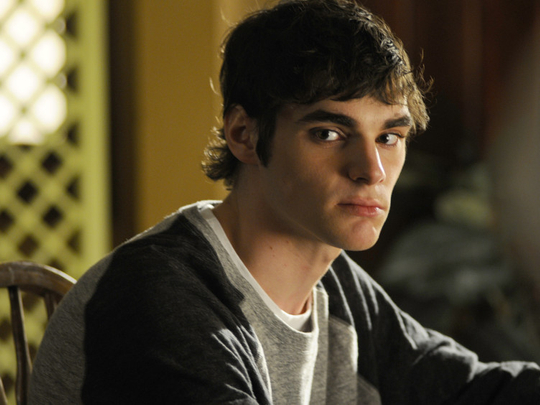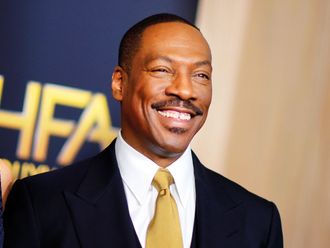
With his wavy black hair, big inky eyes and a grin that could launch a thousand crushes, RJ Mitte has the charm of a bona fide Hollywood heart-throb. Vivienne Westwood clearly thought so when she hired him to walk for her in a runway show last summer, as did Gap when they cast him in a campaign the year before. And when the actor (who has just turned 24) strolls into the Los Angeles hotel where we are meeting for breakfast (at a suitably star-friendly 11am), he brings with him a healthy serving of swagger, too. “But I’m never going to be hired as a leading man,” he tells me, when we are settled in a red leather booth in the hotel’s diner. “Because I don’t sound like a leading man.”
RJ has cerebral palsy, the neurological condition which affects movement and coordination. His is not as chronic as that of the character who made his name, Walter White Jr, in the award-winning US television drama Breaking Bad. In the hit show, Walt Jr walked with the help of a crutch and exaggerated the slurring of his speech. “Even if my speech doesn’t sound too bad to some people, it still gets in the way,” he tells me. “Casting agents want a leading man who sounds crisper.”
He is sanguine about the situation, though. “It doesn’t stop me — I am working all the time.”
So busy is RJ, in fact, that this morning he’s not entirely sure what day it is. He flew in from London just 36 hours previously, where he was preparing for his latest job — presenting the Paralympics coverage on Channel 4 next month. More than 11 million people tuned into the channel’s Bafta-winning coverage of the London 2012 Paralympics; Rio’s follow-up certainly has a lot to live up to.
“People used to call the Paralympics the ‘Special Olympics’,” Mitte says, rolling his eyes. “These men and women are athletes, these are warriors, these are people who are not confined by what they have been given. It’s amazing to see where and how far the human body can really go.”
For Rio, Channel 4 has assembled a squad mainly made up of people with disabilities themselves, and RJ, who calls the channel’s coverage “pioneering” will be acting as a roving reporter and presenter. “I haven’t done much live broadcasting before, but I’m not too concerned,” he says, grinning. “I’m not much of a worrier, I don’t ask too many questions. Just point me in the right direction — that’s how I do my job best.” He’s keen to try out some of the Paralympic events himself on camera. “I hate the gym, but I’ve always played sports — I like wrestling and I reckon I’d be great at wheelchair basketball.”
This will be his first trip to Rio; it’s all caipirinhas and sex, I tell him. “That sounds like something I can get behind,” he says.
Born in Lafayette, Louisiana, RJ was adopted at just a few weeks old by Dyna, a health-care worker, who separated from her husband, Roy, shortly afterwards (RJ stands for Roy Junior), and raised RJ and his younger sister, Lacianne, 11 years his junior, largely alone. As a toddler, he was a severe “toe-walker”, with feet that curled inward and would not bend. It is something that is commonly seen in children with CP, due to a tightness in the tendons, but tests to establish his condition proved inconclusive. Doctors eventually discovered, when he was three years old, that the fact that he had not been breathing when he was born had left him with some permanent brain damage. He wore a succession of leg braces throughout his childhood to stretch the ligaments and tendons, and was given intensive speech and occupational therapy. His mother also made him fold towels, over and over again, to improve his hand-eye coordination. “Smaller, precise, repetitive movements are more difficult with cerebral palsy,” he explains. “Picking up a fork and using it correctly is harder than lifting a 200lb [90kg] weight, because your brain and body don’t always work together properly.” He must have the tidiest airing cupboard in town. “Not really. I was never that good at folding towels.”
When RJ was 11 years old, a truck smashed into Dyna’s car at an intersection, the impact rupturing discs in her spine and fracturing vertebrae, and RJ found himself the household breadwinner. “It was scary, but you make the best of the cards you are dealt, and get on with it,” he shrugs. He began mowing lawns, helping neighbours around the house, selling sandwiches at school (though not attending many lessons himself). It took years of physiotherapy for his mother to achieve the full mobility she has now (“She dropped me off here on her way to run some errands,” he says. “I put her to work these days”). After the family moved to Los Angeles, RJ began taking acting lessons, initially as a way to meet people his own age. “Then I realised there was real money to be made, and I wanted to make a lot of it.”
Within a few months, aged 12, he was working as an extra, on shows such as Hannah Montana, Weeds and Everybody Hates Chris. It’s a lot of responsibility for a teenager, I note; wasn’t he ever tempted to rebel?
“Every day of my life I think about rebellion,” he laughs. “But there are people who are in a position to rebel and people who aren’t. If you’re responsible for other people, that’s just not a luxury you have.” So you won’t spot him stumbling out of strip clubs into the lenses of the paparazzi, like other 24 year olds. He does, however, take his own, small, acts of rebellion where he can. “I used to always arrive everywhere early,” he says. “Now, I’d rather sleep for those extra 30 minutes. It won’t matter if I’m late. That’s my rebellion.”
He was just 13 when he landed a major role in the multi-award-winning drama Breaking Bad. The show’s creator, Vince Gilligan, had auditioned numerous able-bodied actors for the role of Walt Jr, but RJ fitted the character’s description perfectly. “My character was actually based on a real person, a college friend of Vince’s, and one of the reasons he cast me was because I apparently look very much like him, too,” says RJ. By the show’s finale in 2013, it was widely agreed to be one of the greatest television shows of all time. It did not, however, make vast sums of money for all involved. “I’m not saying we didn’t get paid well — we got paid more than most people do for most jobs — but it wasn’t at the level that people expect when they think of the show,” he says. “But I’m not complaining, it gave me a career. I wouldn’t be going to the Paralympics if it wasn’t for Breaking Bad.” Endearingly, he still lives with his mother and younger sister in nearby West Hollywood. “They will be my shadow for the rest of my life,” he laughs. “I’m probably going to be in my late thirties, and I’ll still be like, ‘Hi mum, I’m home’.” And these days, he keeps the worst physical effects of his condition under control with daily stretching.
“But I’m going to be a mean old man, because I’ll be hurting,” he promises. “I have arthritis already.” His body, he says, burns out twice as fast as that of an able-bodied person. “It’s falling apart.” None of which prevents him from following his passions. A keen winter sports fan, he’s considering a temporary move to the mountains for the season. “I don’t really go to events, to network and party, which is a lot of what being here is about,” he shrugs. “And I will always come back to LA. But it’s like a relationship — sometimes you need a break.” As he muses on where he might take this break — Oregon, perhaps — his phone, face down on the table, buzzes. It’s his mother — she’s waiting for him in the car outside, and she won’t stand for any of his small rebellions any more.
RJ Mitte will be in Rio reporting on the Paralympics for Channel 4 from September 7.












